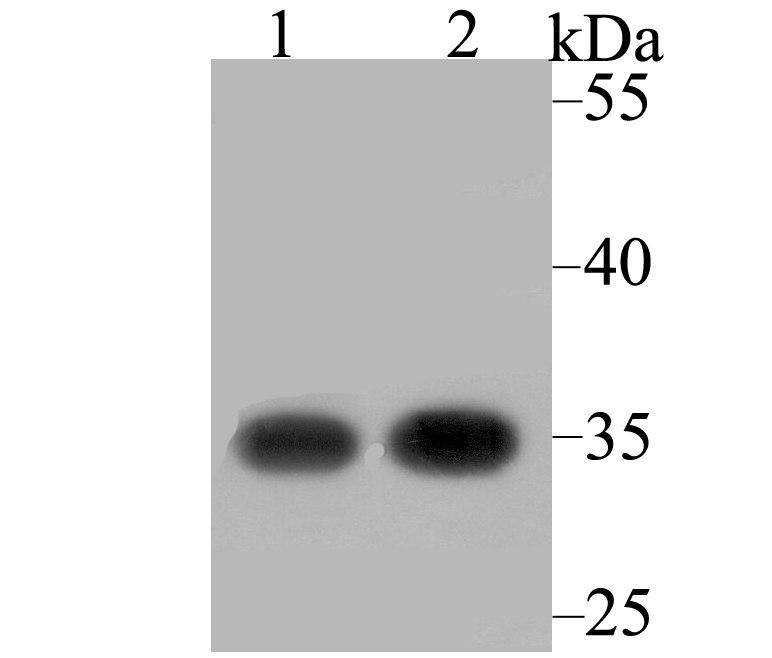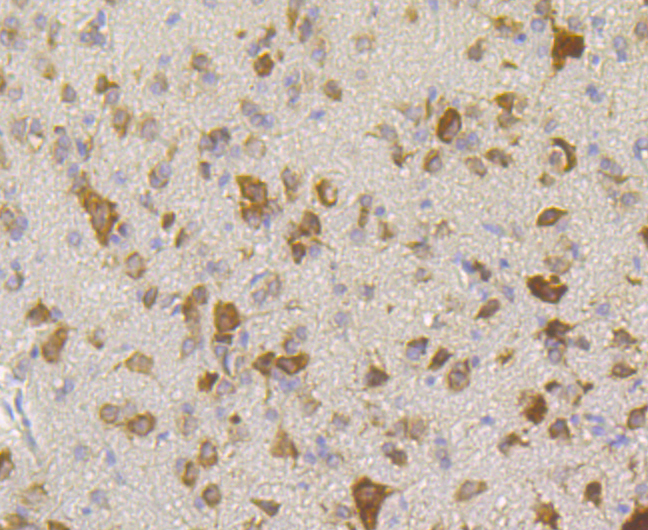Product Name :
RACK1 polyclonal antibody Background :
Members of the protein kinase C (PKC) family play a key regulatory role in a variety of cellular functions, including cell growth and differentiation, gene expression, hormone secretion and membrane function. Receptor for activated C kinases, termed RACKs, are intracellular receptors for activated PKC that may be involved in the activation-induced translocation of PKC. RACK1 (receptor for activated C kinase 1) is a 317 amino acid G protein b subunit-like protein that functions as a RACK and inhibits the activity of Src tyrosine kinases. In response to PKC activation, the intracellular localization of RACK1 and PKC bII changes, and RACK1 and PKC bII co-localize to the same sites. RACK1 is therefore thought to be a shuttling protein for PKC bII. A deficit in RACK1 may be associated with impaired PKC activation in the aging brain. The RACK1 gene is conserved in chimpanzee, dog, cow, mouse, rat, chicken, zebrafish, fruit fly, mosquito, C.elegans, S.pombe, S.cerevisiae, K.lactis, E.gossypii, M.grisea, N.crassa, A.thaliana, rice and P.falciparum, and maps to human chromosome 5q35.3. Product :
Rabbit IgG, 1mg/ml in PBS with 0.02% sodium azide, 50% glycerol, pH7.2 Storage&Stability :
Store at +4°C after thawing. Aliquot store at -20°C. Avoid repeated freeze / thaw cycles. Specificity :
RACK1 polyclonal antibody detects endogenous levels of RACK1 protein. Immunogen :
Recombinant protein corresponding to C-terminal human RACK1. Conjugate :
Unconjugated Modification :
Unmodification
RACK1 polyclonal antibody Background :
Members of the protein kinase C (PKC) family play a key regulatory role in a variety of cellular functions, including cell growth and differentiation, gene expression, hormone secretion and membrane function. Receptor for activated C kinases, termed RACKs, are intracellular receptors for activated PKC that may be involved in the activation-induced translocation of PKC. RACK1 (receptor for activated C kinase 1) is a 317 amino acid G protein b subunit-like protein that functions as a RACK and inhibits the activity of Src tyrosine kinases. In response to PKC activation, the intracellular localization of RACK1 and PKC bII changes, and RACK1 and PKC bII co-localize to the same sites. RACK1 is therefore thought to be a shuttling protein for PKC bII. A deficit in RACK1 may be associated with impaired PKC activation in the aging brain. The RACK1 gene is conserved in chimpanzee, dog, cow, mouse, rat, chicken, zebrafish, fruit fly, mosquito, C.elegans, S.pombe, S.cerevisiae, K.lactis, E.gossypii, M.grisea, N.crassa, A.thaliana, rice and P.falciparum, and maps to human chromosome 5q35.3. Product :
Rabbit IgG, 1mg/ml in PBS with 0.02% sodium azide, 50% glycerol, pH7.2 Storage&Stability :
Store at +4°C after thawing. Aliquot store at -20°C. Avoid repeated freeze / thaw cycles. Specificity :
RACK1 polyclonal antibody detects endogenous levels of RACK1 protein. Immunogen :
Recombinant protein corresponding to C-terminal human RACK1. Conjugate :
Unconjugated Modification :
Unmodification
-
 Western blot analysis of RACK1 on different lysates using anti-RACK1 antibody at 1/2,000 dilution. Positive control: Lane 1: SH-SY-5Y Lane 2: Rat small intestine
Western blot analysis of RACK1 on different lysates using anti-RACK1 antibody at 1/2,000 dilution. Positive control: Lane 1: SH-SY-5Y Lane 2: Rat small intestine -
 Immunohistochemical analysis of paraffin-embedded rat cerebellum tissue using anti-RACK1 antibody. Counter stained with hematoxylin.
Immunohistochemical analysis of paraffin-embedded rat cerebellum tissue using anti-RACK1 antibody. Counter stained with hematoxylin.
Bioworld Biotech only provide peptides for our antibodies and do not provide additional peptide customization services.
Price/Size :
USD 368/1mg/vial
Tips:
For phospho antibody, we provide phospho peptide(0.5mg) and non-phospho peptide(0.5mg).Describe :
Blocking peptides are peptides that bind specifically to the target antibody and block antibody binding. These peptide usually contains the epitope recognized by the antibody. Antibodies bound to the blocking peptide no longer bind to the epitope on the target protein. This mechanism is useful when non-specific binding is an issue, for example, in Western blotting (WB) and Immunohistochemistry (IHC). By comparing the staining from the blocked antibody versus the antibody alone, one can see which staining is specific; Specific binding will be absent from the western blot or IHC performed with the neutralized antibody.Formula:
Synthetic peptide was lyophilized with 100% acetonitrile and is supplied as a powder. Reconstitute with 0.1 ml DI water for a final concentration of 10 mg/ml.The purity is >90%,tested by HPLC and MS.
Storage:
The freeze-dried powder is more stable. For short time at 2-8°C. For long term storage store at -20°C.
Note :
This product is for research use only (RUO only). Not for use in diagnostic or therapeutic procedures.
 RACK1 polyclonal antibody
RACK1 polyclonal antibody  Datasheet
Datasheet COA
COA MSDS
MSDS SHIP
SHIP